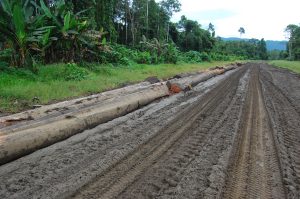Late one night in July 2019, two vehicles packed with police armed with guns and metal bars raced through the rainforests of New Britain, an island in Papua New Guinea’s northeast, toward the village of Watwat.
On arrival, the police launched a violent raid, going door to door, dragging men and boys as young as 16 out of their beds.
“When the boys woke up, they were at gunpoint. [The police] tied their hands at the back and blindfolded their faces so could not see,” said a resident of Watwat village.
The reason for the attack on Watwat village was retribution for the vandalization of nearby oil palm trees.
This is all according to a new report by the human rights organization Global Witness, years in the making, that details how palm oil executives in Papua New Guinea have bribed officials, paid police to brutalize villagers, used child labor, and participated in an apparent tax evasion scheme.
Palm oil is a common ingredient in many foods, with Global Witness finding that palm oil from Papua New Guinea finds its way into the supply chain of global brands including Kellogg’s, Nestle, Danone, and Hershey.
Papua New Guinea is already one of the largest palm oil producing countries in the world, but it is planning for a ten-fold increase by 2030, growing from 150,000 hectares in 2016 to 1.5 million hectares by 2030.
Driving this is a handful of foreign companies, namely from Malaysia, including the East New Britain Resources Group, the Rimbunan Hijau Group, and Bewani Oil Palm Plantations Ltd.
As part of Global Witness’ investigation into palm oil companies in Papua New Guinea, they had an undercover reporter, posing as a commodities trader, meet with Edward Lamur, a founding director of Tobar Investment, an agribusiness company with palm oil plantations around Watwat.
“When we were preparing the land to plant, some people wanted to disturb us. So, we got police, we sat down with them,” Lamur admitted. “They did some bashing up.”
“We went after them in the night, got them, belted them up, and locked them up at the station,” he said. “I made sure those operations were done.”
In a separate undercover meeting, Bernard Lolot, the land acquisitions officer for Tzen Niugini, a company owned by East New Britain Resources Group, admitted to bribing officials to obtain logging permits and access to land. He also admitted that the company uses child labor, with children as young 10 working on their plantations.
Gary Juffa, governor of Oro Province in Papua New Guinea, later criticized the National Parliament for its complicity.
“We have reported about illegal logging and the consequences on the environment and none of your officers have paid a visit to these areas, to carry out an assessment or investigation, to find out what is the reality on the ground. It’s the same for the forest ministry, the lands ministry, and the agriculture ministry,” he said.
“We are losing the forests as we speak, and the landowners cannot go to court because they cannot afford lawyers. And the people there are against very powerful entities – they get the best lawyers. Didn’t we enter parliament to protect PNG interests? How can we turn a blind eye to what is happening here?”













